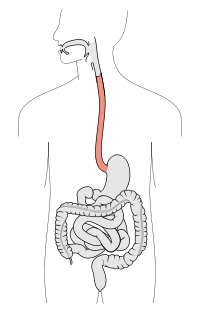
Photo from wikipedia
PurposeTo evaluate the efficacy and safety of the EGIS esophageal stent for treating malignant and benign esophageal strictures.Materials and MethodsData of 73 patients (mean age 63.0 ± 11.9 years; 66 males) with malignant… Click to show full abstract
PurposeTo evaluate the efficacy and safety of the EGIS esophageal stent for treating malignant and benign esophageal strictures.Materials and MethodsData of 73 patients (mean age 63.0 ± 11.9 years; 66 males) with malignant esophageal stricture and 16 patients (mean age 63.7 ± 9.5 years; 13 males) with benign esophageal stricture who received the EGIS esophageal stent (S&G Biotech, Seongnam, Korea) between October 2010 and April 2016 were obtained from a prospectively maintained electronic database.ResultsTechnical and clinical success rates were 100% (89/89). Stent malfunction (i.e., tumor/tissue overgrowth, stent migration, and food impaction) occurred in 20.5% (15/73) and 37.5% (6/16) of patients with malignant and benign esophageal strictures, respectively. Stent migration occurred in five (6.8%) and four (25%) patients with malignant and benign esophageal strictures, respectively. The median follow-up durations in patients with malignant and benign esophageal strictures were 130 [interquartile range (IQR) 76–322] days and 486 (IQR 315–736) days, respectively. Recurrent dysphagia occurred in 14.1% (10/73) and 87.5% (14/16) of patients with malignant and benign esophageal strictures, respectively. The median recurrence-free durations in patients with malignant and benign esophageal strictures were 126 (IQR 69–259) days and 100 (IQR 40–182) days, respectively.ConclusionThe EGIS esophageal stent appears to be effective for malignant esophageal strictures, with relatively low rate of stent migration, whereas, for benign esophageal strictures, it seems to be associated with a high rate of recurrent dysphagia, mainly due to stent migration.
Journal Title: CardioVascular and Interventional Radiology
Year Published: 2017
Link to full text (if available)
Share on Social Media: Sign Up to like & get
recommendations!